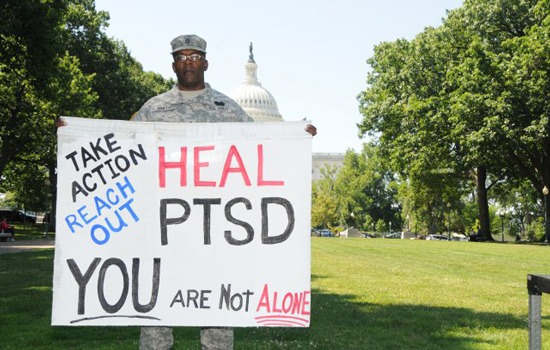Is PTSD Affecting YOUR Family?

Throughout history, it’s been called soldier’s heart, shell shock, war neurosis, and the ‘thousand-yard-stare.’ Today, it is known as Post Traumatic Stress Disorder (PTSD). While names and descriptions for this condition have changed over the years, one undisputed fact exists among them all: PTSD has long been a consequence of war.
PTSD is widely considered a normal stress response to abnormal events. Even though most people have stress reactions following a trauma, their emotions and behavior will typically get better over time. Since June is PTSD Awareness Month, we compiled a list of signs and symptoms to watch out for.
What are the symptoms of PTSD?
Symptoms of PTSD may create a disruption in your life and/or make it difficult to maintain your daily activities. You may even find it hard just to get through the day. If any of the below examples last longer than three months, disrupt your work or home life, and cause a significant amount of stress, please seek help immediately.
Reliving the event (also called re-experiencing symptoms). Memories of a traumatic event come creeping back without warning. You may even feel the same fear and horror you experienced when the actual event took place. For example:
- You may have nightmares.
- You may feel like you are experiencing the event all over again. This is called a flashback.
- You may see, hear, or even smell something that causes you to relive the event. This is called a trigger. News reports, seeing an accident, or hearing a car backfire are examples of triggers.
Avoiding situations that remind you of the event. You find yourself avoiding situations or people that trigger memories of the traumatic event. You may even avoid talking or thinking about what you experienced. For example:
- You may avoid crowds, because they feel dangerous.
- You may avoid driving if you were in a car accident or if your military convoy was bombed.
- If you were in an earthquake, you may avoid watching movies about earthquakes.
- You may keep very busy or avoid seeking help because it keeps you from having to think or talk about the event.
Negative changes in beliefs and feelings. The way you think about yourself and others will change because of the trauma. This particular symptom has many parts, such as:
- No longer having positive or loving feelings toward others, or staying away from relationships.
- Forgetting about certain parts of the traumatic event or not being able to talk about them.
- Thinking the world is too dangerous, and no one can be trusted.
Feeling ‘keyed up’ (also called hyperarousal). You may feel constantly jittery, or always alert and on the lookout for danger. You might suddenly become angry or irritable. This is known as hyperarousal and can result in:
- Difficulties sleeping.
- Trouble concentrating.
- Becoming easily startled by a loud noise or surprise.
- Feeling the need to always have your back to a wall in a restaurant, waiting room or other public places.
What should I do if I have symptoms of PTSD?
PTSD symptoms usually begin shortly after experiencing a traumatic event. However, some people may not experience any of these symptoms for months or years after the trauma. Symptoms may come and go over many years. Because each person and what they experience is unique, you should keep track of your symptoms. If they last for longer than four weeks, disrupt your every-day activities and cause significant distress, please seek professional help from a doctor or counselor. You could also call MilitaryOneSource at 800-342-9647.
Posted June 1, 2017





